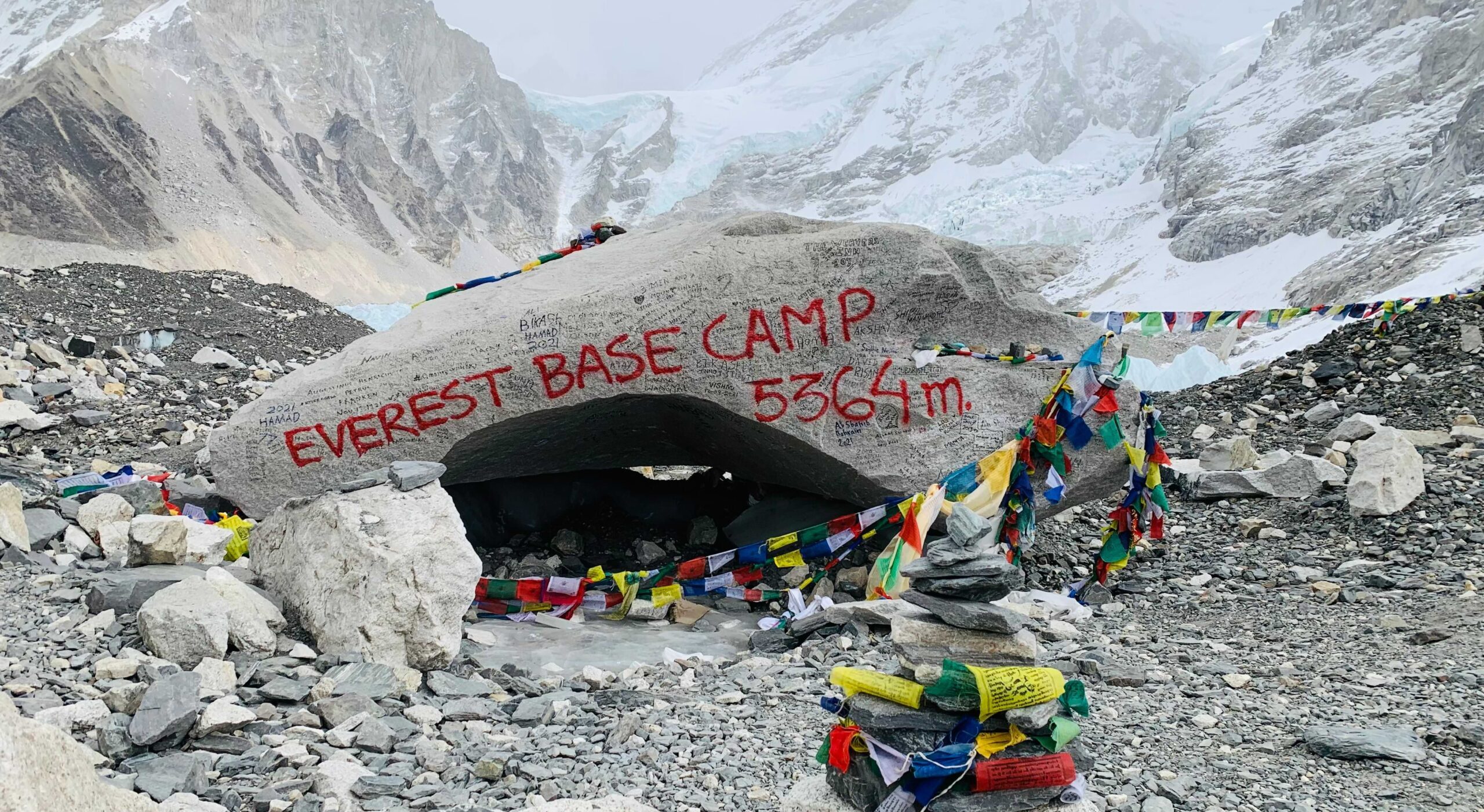
The Himalayan Base Camp Trek is not just about big views and making it to the top (or bottom) of the Earth; it also offers one of the rarest commodities in modern life — a genuine digital detox. In a world that’s always on, always buzzing and blaring with notifications, and glowing with screens, the EBC trail is a source of not only natural, untapped beauty, but also a return to what is, what’s in front of you, and what’s around you. Here, the unreliable Wi-Fi and limited electricity are not a downside — they are an invitation to rediscover yourself and the world in its most natural state.
From the outset of the trek in Lukla, digital distractions are left behind. The signal is weak, and that phone is less about how you keep your lifeline fresh and more about the camera you hope can capture the magic. And the farther you walk into the Khumbu Valley, the more liberating it becomes not to be tied to texts, emails, or social media. You focus instead on the rustle of prayer flags, the crunch of your boots on the trail, and the down-to-earth conversations with other trekkers and Sherpas.
There are no screens to compete with your attention, so your senses are heightened. You take in the view, sense the change in altitude, and listen to the silence of the Himalayas. The Internet has not reached these parts of the world, and so in the teahouses people share stories, read books, and think about the day’s walk. Time stretches out in another, more significant way.
A digital detox on the EBC…is, well, not just a break from the devices—it’s a connection to what really matters, which is nature, community, simplicity, and being in first-person perspective. It’s a rare opportunity to step away from the noise and return with clarity.
Introduction: The Quiet Escape from the Digital Universe
In a world filled with incessant notifications, emails, and social media updates, it may seem impossible to actually disconnect. Many of us are basically continually tethered to our devices, as channels for endless information and digital noise, which often just leaves us feeling mentally overwhelmed. The Everest Base Camp (EBC) trek provides a fantastic opportunity to escape from the online madness and surround yourself with something tangible: nature, solitude, and moments of self-reflection.
This is more than a slog, this is between-the-ears rehab. And yet, as you traverse deeper into the Himalayas, the push-button distractions of modern life are slowly left behind. No constant pings, no breaking news alerts, no algorithm competing for your attention. What doesn’t is pure experience: the sound of your boots on the trail, the rustle of prayer flags in the wind, the rhythm of your breath in the thin mountain air.
The Everest Base Camps is a return to simplicity: waking with the sun, walking for hours under open sky, and closing the day in cozy teahouses with fellow trekkers. It helps you slow down and realize that it’s time to regroup, get reconnected, and find out what it means to show up for yourself.
In a lot of ways, one of the best gifts of the trip is getting away from the digital world on this trek. It leaves room for clarity, reflection, and peace — something we are prone to miss in our overstimulated days.
The EBC trail: A Wilderness of Time out from Civilization
”(The Everest Base Camp trail) It’s not just a trail in the mountains, it’s a natural refuge where digital disturbances are substituted for Himalayan wonders. Winding from the airstrip in Lukla to the base of Everest, the trail meanders through forest, over rushing rivers, and past ancient monasteries in what is some of the most dramatic scenery on the planet. But more than its views, what makes this trail truly exceptional is its ability to yank you out of the mire of modern life.
As you tread deeper into the Khumbu region, the bars on your phone’s signal start to shrink — and along with them, the tug of the outside world. On the internet is now limited to nonexistent, especially in the upper villages. And rather than scrolling through news feeds, your attention turns to the world around you — the texture of prayer stones, the call of Himalayan birds, the towering peaks above.
Free of digital interference, your senses come alive. You come to notice things on a smaller scale – changes in the weather, in the patterns of frost, in the cold and the sun. Conversations even feel a little deeper and authentic without anything to grab your attention in other places.
Here in this natural sanctuary, disconnection isn’t a loss; it’s freedom. The must-see sights on the EBC trail comprise only necessities and get rid of the rest: presence, perspective, peace. It’s the ultimate place to unplug and get back to what’s real.
It is Good to be Cut Off Occasionally
Thus, the concept of spotty or even no internet access during a journey is likely to be something of an inconvenience to most. Yet on the Everest Base Camp trail, limited connectivity is a secret blessing. It offers a room without continual alerts and tasks, a rare opportunity to be in the world without a screen.
Some tea houses on the route provide (usually for a cost) WiFi, but it is slow and weather-dependent. Above higher elevations, it is more or less impossible to use the internet. What initially feels like a deprivation soon turns into a gift: an opportunity to be freed, at least for a few minutes, from work, from news, from social media, and to be fully present in our surroundings.
It’s this respite from technology that lets you reset your brain and emotions. You start to attune to the natural rhythm of the trek — waking with the sun, pushing in silence, resting pointedly. You pay more attention to your thoughts, and conversations with fellow trekkers suddenly hold greater importance without the constant hum of digital distractions.
From most trekkers, there is a feeling of relief, relieved of the pressure to post or respond, they relax back into the simpler things: watching the clouds roll over a mountain ridge, pen to paper by candlelight, being still.
In a world that offers us seldom a moment to unplug, being limited in contact on the EBC trail is a vehicle for reconnection — to oneself, to nature, and to right now.
Recommunion with Self and Nature
The Everest Base Camp Trek Cost is not about the destination – it’s about rediscovering yourself after spending weeks in one of the most remote and beautiful places on Earth. Away from the humdrum of life, what Himalayas present an experience to completely rediscover and connect with nature as well as oneself.
With every day that passes on the trail come moments of solitary peace—early mornings with mountain sunrises, wind rustling through the pines, or the rhythmic crunch of your boots on rocky trails. In these quiet moments, when there’s no digital noise or sounds from the city, your mind has a chance to quiet down. You begin to reflect, breathe more deeply, and listen to what your mind has to say (free from judgment or a sense of urgency).
Nature becomes your friend, your mirror. The mountains are so big and you are so small, and that places you firmly in something larger than yourself. The simplicity of trail life — walk, eat, rest, repeat — strips away all that isn’t necessary, and what’s left is your truest self.
There is a common refrain among trekkers that they have a “mind-opening” experience on the trail. With each step, confusion is replaced by clarity, and gratitude expands. You become more in the moment, more aware, more connected with the world around you.
Let the connection you will feel with yourself and nature on the EBC trek be the greatest reward. It is more than a hike, it’s a return to the essentials: respect, peace, perspective, purpose.
Mindful Trekking: There in Every Step
Conscious trekking is just being there for every step you take, and this is somehow built deeply into the Everest Base Camp trail. Despite this contrast to the hustle and bustle of city life, the EBC trek has a way of allowing you to take time, see, feel, and experience with meaning.
Hiking through forests, over suspension bridges, and up steep ascents, mindfulness here means turning your attention to your breath, your heartbeat, the sounds of the wind, and the crunch of gravel underfoot. It’s about the journey, not rushing to the finish line. When done with intention, every step lends itself to the power of meditation, snapping you back into the present.
Mindfulness also assists in the management of the physical and mental demands of the trek. Instead of fretting over the unknown or reminiscing on the past, the practice of mindfulness trekking is about living in the moment, a crucial skill when it comes to dealing with altitude, fatigue, or challenging weather.
Practicing gratitude, whether silently or in a journal, along the route of your trek, is something many hikers find deepens their experience. Simple acts such as stopping to gaze at a mountain view or taking a deep breath of fresh air become moments of joy and reflection.
In a culture that teaches us to hurry and multitask, mindful trekking is a vital reminder that there is something sacred about going slowly.” On the trail to EBC, each step is not just a step—it’s an experience in being fully alive.
Chat Instead of Notifications
On the Trek to Mount Everest Base Camp, where there isn’t constant digital connectivity – you guessed it – something much more rewarding arises: genuine, unfiltered human connection. It’s a simple matter that when the distraction of your phone buzzing with messages and people posting on social media is removed, conversation naturally becomes deeper, more present, and more meaningful. Trekkers from across the globe sit around the dining tables of teahouses or in silent spaces between on the trail and discuss philosophy, war stories, share their own experiences on the road, and they join hands in shared solidarity of common adversity. Small talk can lead to friendships that last, grounded in the intimacy that blooms when there are no screens to hide behind. Just listening — really listening — comes back to life, and you remember how precious conversation is that you don’t have to type or like. Digital silence heightens these connections; you’re paying a bit more attention to facial expressions, nuances of tone, and pauses. When you laugh longer, think harder, and remember more. These are not just soothing words in the remote Himalayan landscape, they are also words that change you. They show us the potency of presence and the pleasure of relating to others in real time. Here, on the EBC trail, conversation does not fight with notifications for space—it occupies that space, and a small taste of how nourishing and satisfying true face-to-face exchange can be when allowed to bloom.
Writing and Reflecting Without the Distractions
Journaling on the Everest Base Camp trek balances this clarity with the absence of digital distractions stealing your focus. Unburdened by the incessant pings of notifications or the lure of the scroll, the mind starts to slow down and settle on the present. This is a space for honest reflection and greater self-awareness. At the end of a full day of alternating terrain and pushing your body to its edge, sitting at a journal is a ceremony of grounding. You begin to record not only what you saw or did but also how you felt about the people you encountered, the obstacles you surmounted, and the small moments that stirred you. Handwriting becomes a meditative experience; it helps process the feelings that arise when one is untethered and completely involved. It helps you to remember things, to be creative, and to enjoy the journey of trekking. Thoughts that may have disappeared into the whirl of a digital day are now finding their way to the page. And it grows throughout the way, turning into something more than a record — a companion, a sanctuary, a reflection of the journey inside of you. In an increasingly noisy world, journaling without digital distraction, being alone with a pen and paper, may be our rare opportunity to hear ourselves.
The mental health benefits of unplugging
This disconnection of the Everest Base Camp trek has some incredible mental health benefits that are felt days after switching off our gadgets. The brain relaxes when the constant stimuli of screens and notifications are removed. The regular anxiety that can accompany the emails, social media comparisons, and the pressure of continual updates begins to lose its grip. In its stead is a more transparent, more serene state of mind. Simply walking in the peacefulness of the high Himalayas, with majestic peaks, prayer flags, and mountain air, provides a naturally stress-reducing rhythm. With no digital distractions to steal your awareness, your mind becomes more present, more in-tune with your body, and more aware of your environment. This presence leaves room for mindfulness and self-reflection, for a reduction of cortisol and an increase in mood. Sleep frequently improves during the trek, largely due to the exercise and the absence of screen time before bed. Over time, it also helps you develop a sense of self-worth and achievement, and you get the satisfaction of a job well done. You replace mental chaos with peace and simplicity. The disconnection from tech reconnects you to yourself and provides a much-needed break and reset for your brain. When you finally arrive in Base Camp, you are not only physically empowered, but mentally refreshed — brought back to the realization of how important it is to disconnect and breathe, not only for your phone, but for your mind.
Lessons Learned from the Offline Experience
Everest Base Camp Trek Unplugging on the Everest Base Camp trek provided insights that went beyond the trail. It was a world shaped by connectivity, and as I looked up from the offline experience, I realized how much I had been missing by looking down at a screen. I discovered that real connection doesn’t need Wi-Fi — it’s formed through shared laughs, the words of encouragement of other trekkers, and the quiet comfort of taking things one step at a time in each other’s company. I noticed how frequently I dig out my phone as a pastime, not out of necessity, and how liberating it is to sever that routine. Time seemed to expand in the absence of constant digital tug, and I found myself appreciating the small things: the sound of yak bells, the warmth of tea by a fire, the way sunlight dances on a snow-capped peak. I was more mindful of my thoughts, emotions, and environment, and more grateful for the natural cadence of every day. Being offline allowed me to reset my priorities and see the value in stillness, patience, and presence. It was a reminder for me that a lot of what we are looking for on the internet ─ validation or entertainment or distraction ─ is available in the real world, in more meaningful and less self-absorbed ways. The experience was not just of surviving without the internet, but of thriving without it, and of the reawakening of that consciousness, learning to let the internet supplement, not drown out, life offline.
Taking the Detox Mindset Home
Now that we’re back from Everest Base Camp, the new difficulty is keeping the clarity and calm acquired from being offline. The digital detox can last beyond the trail — it can be hand-delivered back into your daily life in meaningful ways. One of the initial ones is becoming more intentional around technology. Rather than mindlessly scrolling, set boundaries: Turn off notifications, schedule time away from screens, and prioritize face-to-face communication. The hush and simplicity of the mountains can be mimicked in everyday routines — in morning journaling, in mindful walks, in moments of quiet without the presence of a device. It’s to protect that mental space for creativity, reflection, and simply the space to be. The trek also imparts the importance of doing one thing at a time, whether that’s eating without a screen, listening completely when you’re in conversation, or simply watching the world go by rather than racing to post about it. All these small incremental shifts produce mental clarity and emotional equanimity. You don’t need to move to the Himalayas to feel grounded — you just need to make space for it. To bring the detox state of mind home is to value connection over consumption, experiences over updates, and presence over distraction. It’s a daily practice, yet one that leaves you grounded in what counts, long after the trail is over.
Why is it good to unplug?
Everest Base Camp Treks. We do many things to try to help improve the physical health of the world, and unplugging from technology is one of the best things we can do for it in today’s hyper-connected world. Continuous digital exposure saps our mental energies, shortens our attention span, and creates stress we do not need. And, as we all know, a break from screens gives our minds time to reset, refocus, and recharge. When we unplug, we provide a little space to be more open: to walking outside and taking in what surrounds us, to talking to someone, or simply to listening to our thoughts without interruption. Unplugging helps improve sleep by cutting down exposure to blue light and calms the nervous system, so that you can reduce panic and increase clarity. It also boosts creativity, since the brain isn’t always in reactive mode to digital noise and distractions. By disconnecting from the online world, we not only begin to take note of little things again — the feel of the sun on our skin, the taste of good food, the love in a quiet shared moment — we start to distance ourselves from a culture that no longer serves humankind. Your entire life takes on a sense of intention and gratitude. Unplugging is not about saying no to technology, but about saying yes to attention—and using it to make the world more just, fair, and healthy. Whether for a few hours or a few days, these digital breaks give our minds a chance to recharge, reflect, and reconnect with the world — and with ourselves.
Why is unplugging from technology important?
Everest Base Camp Unplugging from technology is special because it gives balance in a world where digital demand never stops. Our gadgets connect us to the world, but they can also stress us out, make it difficult to sleep, and take a toll on day-to-day life. Digital engagement doesn’t allow for quality connection or being ‘present’. When we power down, we give our nervous system a break, letting us reconnect with reality — the people, places, and experiences around us. It can aid mental clarity, enhance sleep, and deepen social connections, they added. It also relieves you from the suffocating pressure of online comparisons and the FOMO (fear of missing out), and contributes to a higher sense of self-awareness and emotional strength. Or at another level, it allows us to take time back for creativity, mindfulness, and hobbies not involving screens. It’s not a matter of rejecting technology altogether — it’s a question of being more mindful about its use. Unplugging regularly restores our ability to think, to be at rest, to live. Whether it’s a weekend in the wilderness, an hour of no-device time each day, or just turning off the notifications, unplugging is a form of self-care, and it’s key to well-being in the digital age.
Why is disconnecting important?
Disconnecting is crucial to give oneself the space and freedom to distance oneself from the constant noise of life and focus inward to a deeper level of self. In an environment in which we’re expected to always be contactable, answerable, and consuming, disconnecting is a radical, and all the more essential, act of self-preservation. It relieves our brains from an overload of information, creating room for a little bit of clarity, calm, and creativity. Freed from the compulsion to react or to be informed, we suddenly recognize what we had overlooked: the calmness of silence, the profundity of our thoughts, the splendor of a silent sunrise. By disconnecting, we deepen our emotional intelligence and learn to set more respectful boundaries digitally and personally. It challenges us to live more thoughtfully, more in the moment with family and friends, and to focus on the things in life that matter. Whether it’s a stroll in the woods, a day without social media, or a few hours spent with the phone in airplane mode, physically disconnecting allows us to recalibrate and have a chance to breathe, think, and just be. By seeking it, we will not only escape stress and fatigue but also allow ourselves to return to a slower, more meaningful way of life—one in which we can hear our call once again.
What to do when unplugging?
Mount Everest Base Camp Trek. When you’re using this as an opportunity to inherently unplug, the trick is to replace that digital-free time with activities that nourish your body, mind, and spirit. Free from the usual distractions of screens, you can slow down and pay attention to your environment. Take a walk or go for a hike where the rhythm of your steps and the noise around you bring you into the present moment. Open a book, write in a journal, do something creative, such as paint or take some photos — this analog input jolts your imagination and focus back to life. Give it a shot by meditating, doing some yoga, or just sitting and observing your thoughts without judgment. Spend time with others in person: make conversation, cook a meal, play a board game. You could also try hobbies you’ve been wanting to renew, or teach yourself something new, like a language or an instrument, or a craft. And the time you gain by unplugging is also perfect for reflecting on goals or dreams you may have put by the wayside. Your mind can wander, mull things over, and hit reset. The point isn’t just to “do” things but to be “in” whatever you do. When you unplug, you have a chance to recharge, and I don’t just mean by taking a break and doing nothing on the couch; I mean drinking in the moments that make you feel happy, peaceful, and clear.





